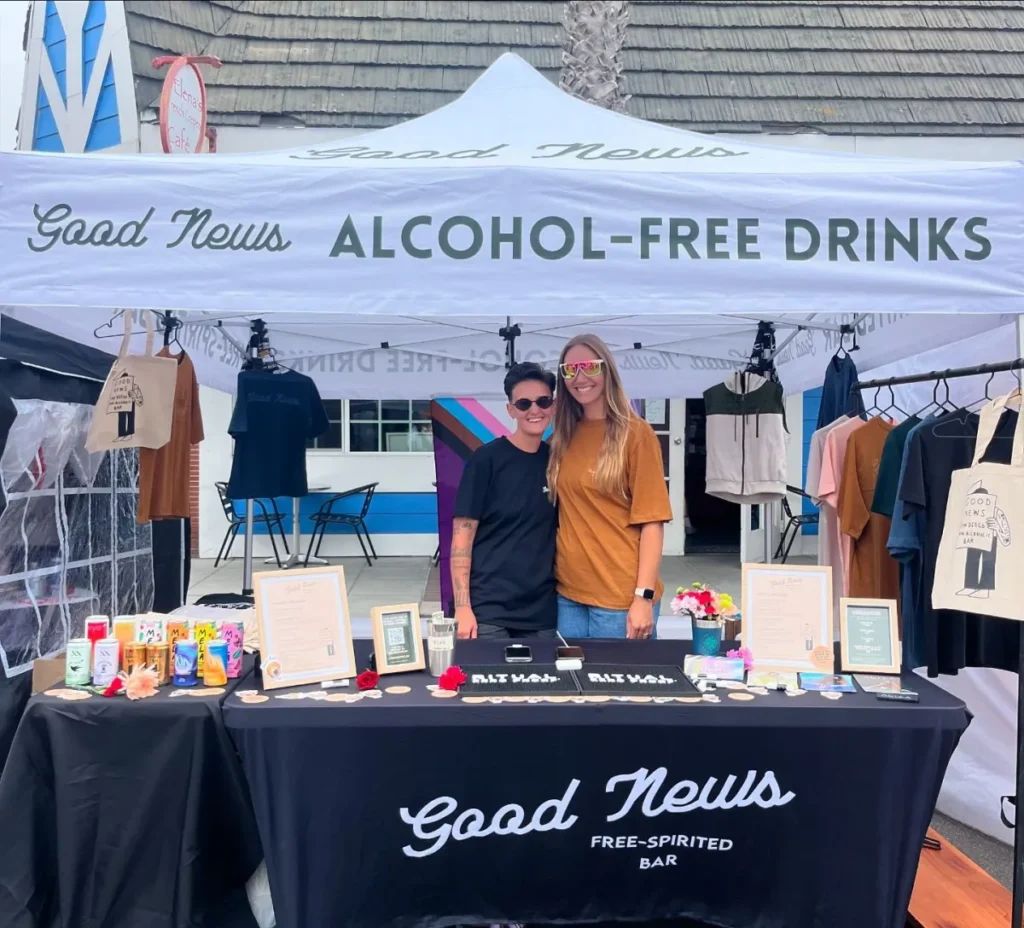Bars have long been a key part of LGBTQ+ culture. They provide us with safe havens where we can be ourselves, fall in love, and meet friends that often become family. They give us a place to rally and organize, to grieve and celebrate. Patrons of the Stonewall Inn, a queer bar in New York City, sparked the Stonewall Riots, which galvanized the fight for LGBTQ+ rights. Drag brunch shows and bingo nights bring LGBTQ+ locals together on a regular basis. Yet, for all of the connections LGBTQ+ bars foster within our community, they can also be a cause of isolation.
Alcohol is a core component of the traditional bar experience, leaving sober members of the community and those who prefer not to drink with limited options for participating. The prevalence of systemic discrimination, mental health issues, and homophobic violence often contribute to higher levels of alcohol use within the LGBTQ+ community. Approximately 3.5 million LGB adults over 18 struggle with alcohol use disorder, and amongst trans and nonbinary individuals, trans men are especially at risk of developing alcohol use disorder. Additionally, people choose not to drink due to health conditions, religious reasons, pregnancy, designated driving, and allergies. With so many in the LGBTQ+ community requiring sober experiences, how can they engage with others when bars are such a key part of queer community building?
This is the question facing LGBTQ+ bar leadership across the country. While some aren’t considering sober patrons in their offerings yet, and others experiment with how to best serve them, a few have found solutions that end the alienation felt by sober patrons without hurting their bottom line.

The most obvious solution? Making existing LGBTQ+ bars more inclusive and appealing to sober patrons. There are a myriad of ways that queer bars can—and are—making that shift. One of the most obvious changes is adding non-alcoholic craft beverages to the menu. Rather than forcing sober patrons to choose between soda and water, bars are now creating mocktails at the same level as the signature cocktails they offer. The Ruby Fruit, a “wine bar for the sapphically inclined” in Los Angeles, and Mary’s, an Atlanta institution named one of the best gay bars in the world by Logo, include mocktails on their menu, ensuring LGBTQ+ guests feel welcome no matter their relationship with alcohol.
Another easy way to alleviate the pressure to drink in queer bars is to nix drink requirements. As a way to ensure income, bars that offer free admission or low-cost event tickets will sometimes require patrons to purchase a minimum number of drinks. Requiring a dollar-spend instead is an easy way to consider the needs of sober patrons.

A much more radical shift? Alcohol-free bars. Good News, an LGBTQ+-owned alcohol-free pop-up, will soon open its first brick and mortar bar in Hillcrest, San Diego’s gayborhood. Owners Kaylee and Crystal Clark use the brand’s social media to explain the ins and outs of why people may choose not to drink and educate future patrons on the pricing of non-alcoholic cocktails, which may include non-alcoholic liquors. These newer “liquors” offer drinkers the taste of alcohol without hangovers and other physical effects. In cost, they’re similar to traditional alcohols, allowing bars to charge similar prices.

Some members of the LGBTQ+ community have suggested it may be time to evolve beyond bar culture. In recent years, there’s been a rise in queer cafes. Everyone’s a “friend of Dorothy” at Brick Road Coffee in Tempe. Owned by husbands Gabe Hagen and Jesse Shank, the shop focuses on community by hosting events and teaming up with local organizations. Despite a lack of alcohol, the Brick Road Coffee is offering locals the same benefits that LGBTQ+ bars do.
In Louisville, KY, Sis Got Tea, a LGBTQ+-owned, Black-owned, and woman-owned tea shop and cafe, offers similar benefits to its community. Founder Arielle Clark “strives to keep Sis Got Tea as accessible, accepting, accountable, and sober as possible.” The cafe offers events, such as an ace/aro/demi spectrum meetup, coworking hours, and a craft circle on a regular basis, ensuring that people can meet and connect.
While the sober-inclusive examples above are a minority in the world of queer bars and spaces, they are proof that things are changing. More and more entrepreneurs are considering the needs of sober members of the community, ultimately making LGBTQ+ havens a safer space for all.
This article was first posted on News Is Out


